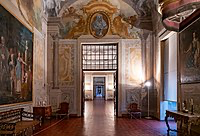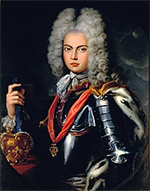King John V of Portugal
John V was King of Portugal for most of five decades in the 18th Century. He oversaw a great increase in his country's riches from overseas and, unlike many before him, ruled as an absolute monarch. He was born on Oct. 22, 1689, at Riberia Palace in Lisbon. His father was the reigning monarch, Pedro II, and his mother was Maria Sofia of Neuburg. John was his parents' second child called John; the first died at age 2, a John had five other siblings, and they all enjoyed a strong and rich education from Jesuit teachers. Among the subjects that John studied were astronomy, history, mathematics, nautical studies, and political affairs. John's mother died when he was 9, and the boy grieved in private, struggling with depression. He contracted a strong illness the following year and narrowly escaped death, enjoying a full recovery that surprised many around him. King Pedro II died in December 1706, when John was 16. The young heir apparent was proclaimed king on Jan. 1, 1707. At that time, Portugal was embroiled in the War of the Spanish Succession. A subsequent treaty with England led to an alliance with Austria as well, against Spain. Portugal was well invested in that alliance, even contributing troops for an invasion of Spain. An Allied force led by Portugal's Marquis of Minas took Madrid in 1706. That was nowhere near the end of the war, however. It dragged on, with Portugal contributing manpower and money at varying levels. John finally secured peace with France in 1712 and Spain the year after that. John V married Maria Anna of Austria, whose father was the Holy Roman Emperor Leopold I. They had six children, four of whom lived into adulthood: Barbara (1711), Joseph (1714), Carlos (1716), and Peter (1717). John's marriage to the daughter of the Holy Roman Emperor brought a strong alliance with that political entity. A skilled diplomat, John also maintained good relations with other European powers for the rest of his reign. The king inherited a system of wealthy imports of diamonds and gold from Brazil, and the continued influx of that wealth pouring directly into the royal coffers strengthened his efforts to be much more of an absolutist than his immediate predecessors. His immense personal wealth meant that he didn't depend on gathering the Cortes in order to call for tax collection; in fact, John never called the Cortes at all. Ignored as well was the Council of State, which was intended to give the king advice on how to run the country. John had a few prime ministers, whom he consulted exclusively. 
Despite his absolutist tendencies, John encouraged others to love learning as he did, and he established museums of architecture and natural history, along with the Royal Academy of History. He was a strong patron and lover of the arts. He dedicated vast sums from the royal treasury to the construction and enhancement of ostentatious buildings such as Mafra Palace; he also had built repositories for housing his growing collection of art works, literature, and music. The king also enjoyed collecting antiquities. He lost much of this in the aftermath of the 1755 earthquake, which left Lisbon in devastation exacerbated by subsequent fires and floods. A man of strong Christian faith, he spent much of his day in prayer and religious contemplation. Pope Benedict XIV granted him the status of Most Faithful Majesty. In addition to Brazil, Portugal during John's reign gained or solidified territorial holdings in Angola, East Timor, India, Kenya, Mozambique, and Uruguay. John's forces defended the Uruguay territory against Spanish invasions in 1735–1737. In 1742, the king suffered a severe illness; from that one he never fully recovered. His wife served as regent, and the country suffered from economic and political uncertainty. John V died on July 31, 1750. His son Joseph took the throne.
|
|
Social Studies for Kids
copyright 2002–2026
David White



 year before the second son named John was born.
year before the second son named John was born.
